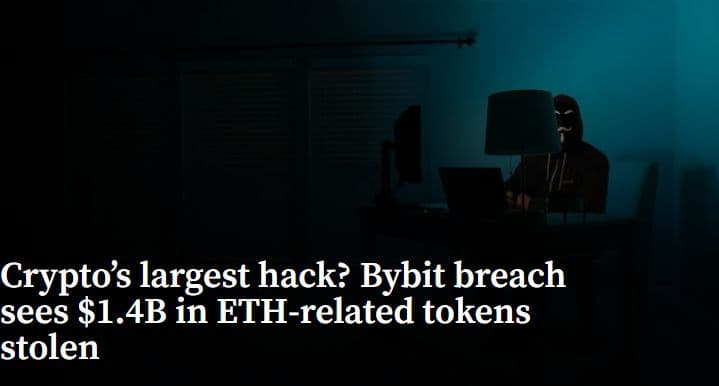Billion-dollar Hack of Bybit

On February 21, 2025, the cryptocurrency world was shaken by shocking news: Bybit, one of the world's largest cryptocurrency exchanges, suffered a massive hack that resulted in the loss of approximately $1.46 billion in Ethereum. This incident has become the largest cryptocurrency theft in history, surpassing previous attacks such as Mt. Gox in 2014 and Poly Network in 2021.
Attack Details
According to reports, hackers managed to access one of Bybit's Ethereum cold wallets, transferring the funds to unknown addresses. Bybit's CEO, Ben Zhou, confirmed the incident through his X account (formerly Twitter), assuring that only the Ethereum wallet was affected and that the platform's operations continued normally. Zhou also affirmed that all customer funds were safe and backed on a 1:1 ratio.
The attack not only affected Bybit but also had an immediate impact on the cryptocurrency market. Ethereum's price fell more than 4% in the hours following the announcement, and other cryptocurrencies also experienced significant drops.
Suspicions about Lazarus
Preliminary investigations suggest that the North Korean hacker group Lazarus could be behind this attack. Lazarus is known for its sophisticated attacks on cryptocurrency exchanges and has been attributed with several high-profile thefts in the past. Blockchain security companies like Fireblocks have pointed out similarities between this attack and previous ones attributed to Lazarus, such as the attacks on WazirX and Radiant Capital in 2024.
Market Impact and Reactions
The Bybit hack has generated a wave of concern in the crypto community. Many users expressed concern about the security of their assets on centralized exchanges, which led to an increase in fund withdrawals from various platforms. Blockchain security experts have emphasized the importance of improving security measures in exchanges and have urged users to consider using cold wallets for long-term storage of their cryptocurrencies.
The reaction of the Korean community has been particularly intense. In forums and social networks, many users expressed their frustration and concern about the possible involvement of North Korea in the attack. Some have called for stronger actions from the international community to combat state-sponsored cyberattacks.
Security Measures and Bybit's Future
Bybit has assured that it is working with security experts and authorities to investigate the incident and recover the stolen funds. The company has also announced that it will implement additional security measures to prevent future attacks. These measures include reviewing its cold storage protocols and implementing more robust authentication systems.
Despite the initial impact, many analysts believe that Bybit will be able to recover from this incident. The platform has a solid user base and has demonstrated its ability to handle large transaction volumes. However, the incident has rekindled the debate about the need for greater regulation in the cryptocurrency sector and the importance of security in centralized exchanges.
Lessons for the Future
The Bybit hack serves as a reminder of the inherent risks in the world of cryptocurrencies and the importance of security in the blockchain ecosystem. Many experts suggest that this incident could accelerate the adoption of decentralized solutions and the development of more advanced security protocols in the industry.
For individual users, the message is clear: diversification and caution are fundamental. It is recommended not to keep large amounts of cryptocurrencies in exchanges for extended periods and to consider using hardware wallets for the secure storage of digital assets.
In conclusion, the Bybit hack marks a before and after in the history of cryptocurrency security. As the industry recovers from this blow, it is clear that security and trust will continue to be central themes in the future development of the crypto ecosystem. The community hopes that this incident will serve as a catalyst for significant improvements in the security and regulation of the sector, ensuring a safer future for all participants in the cryptocurrency market.
Discover More

The Tragic Death of Kim Sae-ron: Media Pressure and Lessons for Korea
A deep analysis of the suicide of South Korean actress Kim Sae-ron (1999-2025), exploring the reasons behind her final decision: online harassment, professional failure after a DUI accident, and the relentless culture of repentance in the Korean entertainment industry. Includes reactions from netizens and parallels with Latin American cases.

The Hong Jang-won Scandal
Hong Jang-won, former deputy director of South Korea's National Intelligence Service, is at the center of a political controversy. His statements about an alleged mass arrest plan have shaken the political landscape.